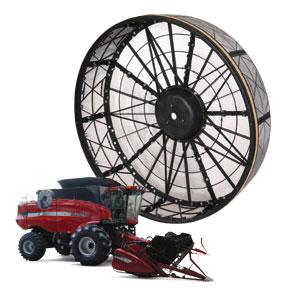Search Case Studies
End-Use Case Study
- Dissipative Compound Reduces Maintenance Downtime
 Mother Nature waits for no man, and no man knows that like a farmer.
Mother Nature waits for no man, and no man knows that like a farmer.
CNH, renowned manufacturer of agricultural equipment, attempted to favor the farmer by cutting maintenance downtime for their Case IH Axial Flow combines and Cotton Express cotton pickers. To do so required a project—and a part—nearly as large as Nature itself.
The machines have water-cooled engines and make use of a hydraulically-driven rotary screen to filter chaff, cotton lint and other debris, allowing air flow through the radiator cooling system. Originally made of steel, the screen assembly measured 42 inches (107 cm) in diameter, 10 inches (25 cm) in depth and weighed 120 pounds (54 kg). It was fabricated from perforated metal and collected debris was automatically brushed off. In use, because of large-sized holes, debris would plug the radiator coolers, requiring manual cleaning. The challenge faced by CNH was to maintain the same air flow but reduce the particle size of debris allowed to the cooling system, and reduce the part weight while maintaining the electrical conductivity necessary to eliminate static build-up on the metal screen.
A thermoplastic material would be ideal for weight reduction and conductive compounds offer the necessary static dissipation. CNH worked with RTP Company to select the right material. The screen assembly frame consists of 10 longitudinal and 15 radial ribs extending from a center hub. Up to 3/4 inch (19 mm) thick, they must bear structural loads and maintain accurate positioning. To replace steel, polypropylene offered the necessary blend of strength and chemical resistance. But polypropylene’s crystalline structure precluded accurate injection molding of a part so large. Structurally foaming an RTP 100 Series conductive polypropylene compound provided the close tolerance molding along with required static dissipation. Glass fiber reinforcement in the material provided an adequate tensile strength of 4,000 psi (28 MPa) and a flexural modulus of 0.45 psi x 106 (3100 MPa).
The filtering screen is now die cut and overmolded to the frame on a vertical rotary injection press. For this procedure another RTP 100 Series glass reinforced polypropylene compound is used. It is also electrostatically dissipative and exhibits minimal and predictable mold shrinkage, keeping the surface of the screen taut. Use of static dissipative compounds allows the wire screen to discharge through the plastic material to the grounded hydraulic drive. This effectively eliminates the need for any sophisticated grounding harness.
According to CNH engineer Richard Crabb, “The materials are fully capable of the discharge necessary to keep the screens clear. The combination of strength, processing ease and dissipation characteristics are well suited for the demands of agricultural use. These compounds were selected for reliability.” He added, “Combining innovative materials with an innovative process achieved a marked improvement; cotton picker cleaning frequency was dramatically reduced from once a day to once a year.”
Recognized by its distinctive red color, Case IH agricultural equipment is used by farmers in 150 countries. Case IH is one of nine brands of farm and construction equipment manufactured by CNH. For more information, visit their website at www.caseih.com.




